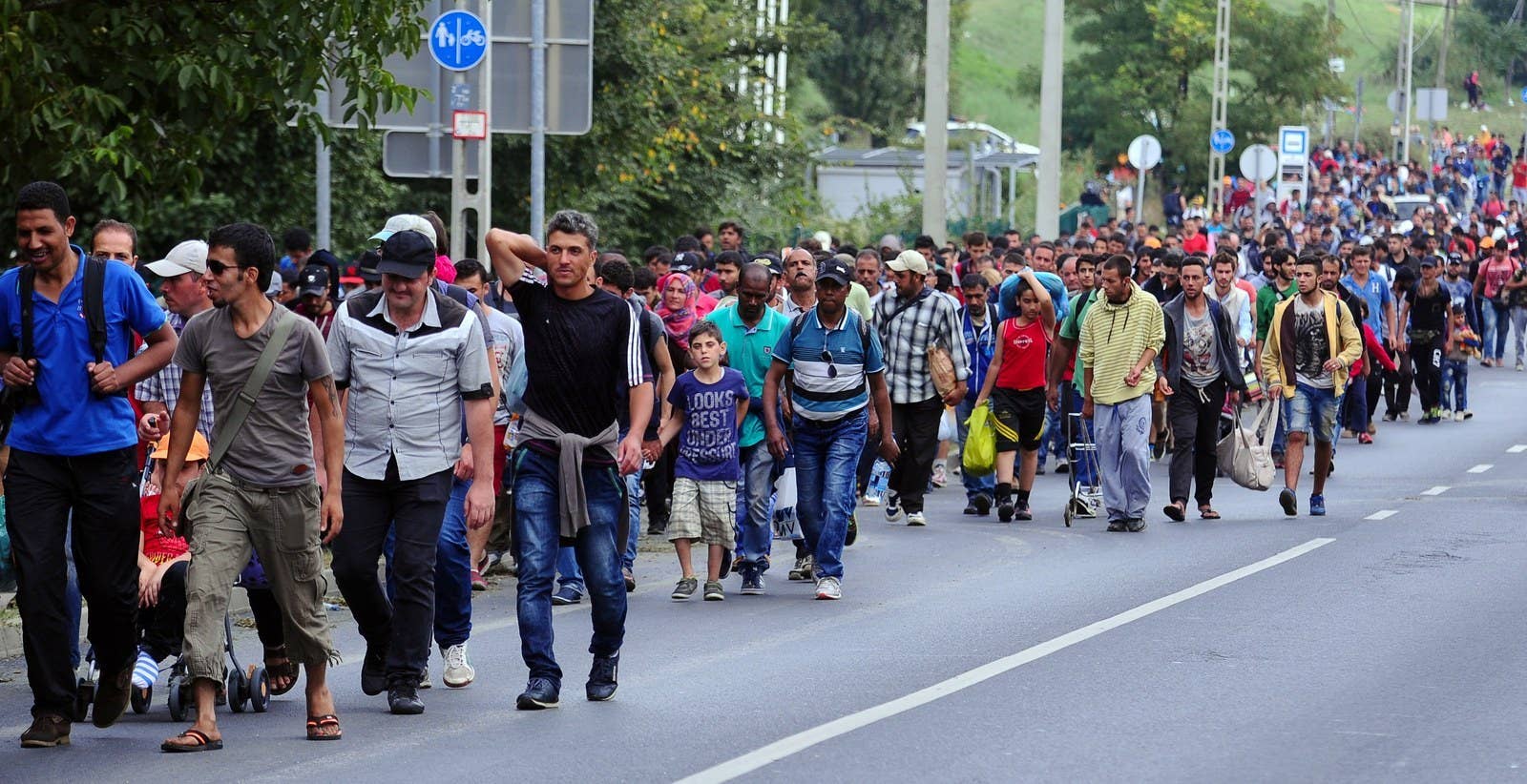
FREITAL, Germany — Before the refugees started pouring into Germany’s train stations by the thousands, then the tens of thousands, trouble came to Freital in the form of 280 people.
It was early spring, and Freital, a blue-collar town in the southwestern suburbs of Dresden, was an unlikely place to spark national controversy. With a population of around 40,000, Freital is a place of modest aspirations and limited economic opportunities in the eastern state of Saxony. Kebab shops share space on the main drag with tattoo parlors and slot-machine bars, and few Dresdeners are likely to have visited, despite the town being just a short train ride away from the main city.
So when the government declared in March this year that it intended to relocate 280 refugees from a temporary tent city in Chemnitz, 50 miles away, to an abandoned hotel in the foothills above Freital, the outcry from the town took many by surprise.
For several weeks, angry crowds gathered in front of the hotel, the Leonardo, while on Facebook, residents and anti-refugee activists expressed vitriolic dissent. They soon found their words amplified by regional right-wing politicians, and their ranks were joined by residents with more radical proclivities: small, neo-Nazi-inspired gangs with names like Vigilance Freital and Freital Resists, who hung out at local bars and soon became vocal participants in the protests.
The tension finally spilled over one week in late June. German authorities had begun sending the refugees to the Leonardo by bus, in batches of 50. As they arrived, they were greeted by loud, jeering mobs — first 70 or so anti-refugee protesters, then 100, then hundreds, waving anti-immigrant banners and shouting ugly slurs: “Foreigners get out!” “No to asylum pigs!” "Keep fleeing!" More and more residents arrived; a pro-refugee group joined the fray. Some people threw empty bottles and rotten eggs. Someone gave the Hitler salute. It was two days before the police restored calm.

Calm has been hard to come by in Europe lately. Over the past several months, an urgent situation over immigration has evolved into a full-blown crisis — and not just for Germany. As tens of thousands of refugees and migrants flowed into Greece and across eastern Europe, countries like Hungary and Croatia began constructing border fences and closing down crossing points, leading to bottlenecks of truckers and refugees along major highways, and even some clashes. (By one count, as a result of the crisis, Europe is soon to have more physical barriers along its borders than it did during the Cold War.) Last week, Croatia opened its doors to refugees blocked from entering Hungary, only to be stunned by the number of people who arrived and quickly reverse course. The Croatian government then ordered buses to ship the migrants up to its own border with Hungary and deposit them there, prompting Hungary to accuse Croatian officials of "people smuggling."
Across eastern Europe, many pointed the finger at Germany for amplifying the crisis — in late August, Germany announced that it would accept as a refugee any Syrian who reached its borders. But Merkel's domestic problems may yet outpace her diplomatic ones: Today, thanks to the immigration crisis, Germany faces a bitter contest for national solidarity and stability, and a challenge from the far right on a scale that hasn't been seen in decades.
Freital wasn't the only town in Germany to witness a violent reaction to the influx of refugees in 2015. In April, in the town of Nauen, south of Berlin, protesters marched through the streets, chanting “No to the asylum hotel!” and “Nauen will stay white!” By the end of the summer, 2015 had seen as many attacks and protests against refugees and their places of asylum across Germany as did all of 2014. A few weeks after the rallies in Freital, violent protesters assembled outside a refugee shelter in Heidenau, just southeast of Dresden, and back in Nauen, someone finally took the action protesters had long threatened: A sports hall slated to host 130 refugees was burned to the ground.
"The question to ask is not why a refugee house in particular was burned, but why are there so many people in our society that like to burn refugee houses?"
Nationwide, a solid majority of Germans still say that they support the government's efforts to help refugees. But the far right has seized the opportunity presented by the crisis, and right-wing political movements are on the rise. In Dresden, an organization called Pegida, or Patriotic Europeans Against the Islamization of the West, surfaced last year and quickly gained strength, holding weekly rallies to protest the government’s policies of lax borders and generous benefits for asylum-seekers.
By the end of 2014, the rallies were drawing some 20,000 people to the reconstructed old city. There, standing before a statue of Martin Luther, the group’s leaders called for the resignation of Angela Merkel, Germany’s chancellor, and for strict limits on immigration, while crowds chanted, "We are the people." Their complaint — reminiscent of Tea Party objections to the policies of Barack Obama in the United States — centered around a perception that the federal government was trampling on the independence of those outside Berlin, imposing on them an influx of refugees from the Arab world who would take jobs, increase crime and terrorism, and, more ominously, somehow diminish the national character.
Ulli Jentsch, director of the Anti-Fascist Press Archives and Education Center, or Apabiz, an organization that closely monitors right-wing extremism in Germany, compares the atmosphere in the country to that of 1992, shortly after the country's post-communist reunification, when mobs of neo-Nazi groups rampaged immigrant housing facilities in places like what had been East Berlin and Rostock-Lichtenhagen, on the northern coast. Back then, he told me, the response from the government was widely criticized for its timidity — Angela Merkel, then Minister for Youth, was famously photographed in Rostock meeting with a group of skinheads, and many still view the government's excessive focus on the concerns of the protesters, rather than the safety of the refugees, to have been a moral miscalculation.
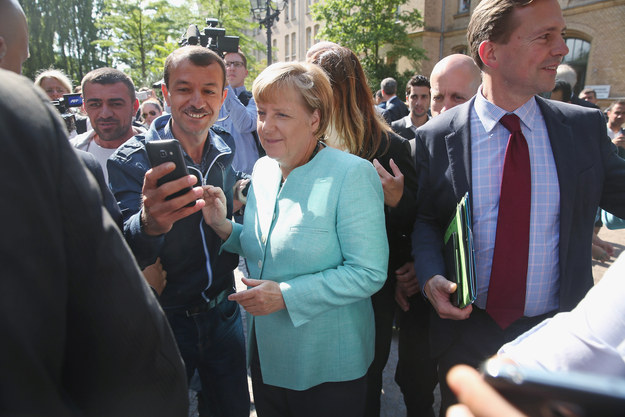
Today, Merkel seems determined to not repeat the error. After the violence in Heidenau, she visited the town and condemned the events there as "shameful and repulsive." Locals greeted her with signs calling her a "traitor" and a "slut."
Early in September, many Germans seemed wrapped up in a newfound attitude of generosity and warmth toward the refugees, especially in Munich and Berlin. Jentsch is among those who doesn't expect it to last. "As an antifascist researcher in Germany, I would never be optimistic," he said. It was only a matter of time, he went on, before the worst of the troubles resumed — the anger and discontent run too deep. (On Sunday, an arson attack in the town of Heilbronn, near Stuttgart, damaged a sports hall that was being prepared to house refugees.) As yet it is unclear whether this anger extends beyond the extremist fringe. "For the radicals, it's a question of German blood," he said. "It's the old-fashioned racism, but there is also something deeply rooted in German society that preserves it. The question to ask is not why a refugee house in particular was burned, but why are there so many people in our society that like to burn refugee houses?"

“I was just glad the refugees didn’t understand German,” Nico Brachtel said in early September as we sat on the grassy banks of the River Elbe in Dresden. A premature winter chill clung to the air. Brachtel, who is 16, with shaggy hair and a placid face that betrays little of what he is thinking, wore a thick flannel shirt, dark gray Vans, and a flat-brimmed baseball cap pulled low over his eyes. For several months now, he's been an activist in Freital, where he lives, working to support refugees, or at least repel the growing mobs of anti-refugee partisans.
The effort has come at a significant risk, and cost. Both Brachtel and his mother, Steffi, a 40-year-old waitress at a slot-machine parlor, have faced menacing and threats. They've also lost friends, even relatives. “For example, there's my uncle — or, I should say, my ex-uncle,” Brachtel said. "I'm not allowed to call him 'uncle' anymore." Steffi and one of her brothers got into an argument over the country’s policy toward refugees that grew so heated he no longer speaks to her family. It often feels to Nico and his mother that the entire town of Freital is against them, and when I asked if they’d be willing to talk to me, they said they’d prefer to meet in Dresden so they could speak more freely. Protests in Freital have continued, and in late July, an explosion destroyed the car of a politician who had supported the refugees, while it was parked in front of his home.
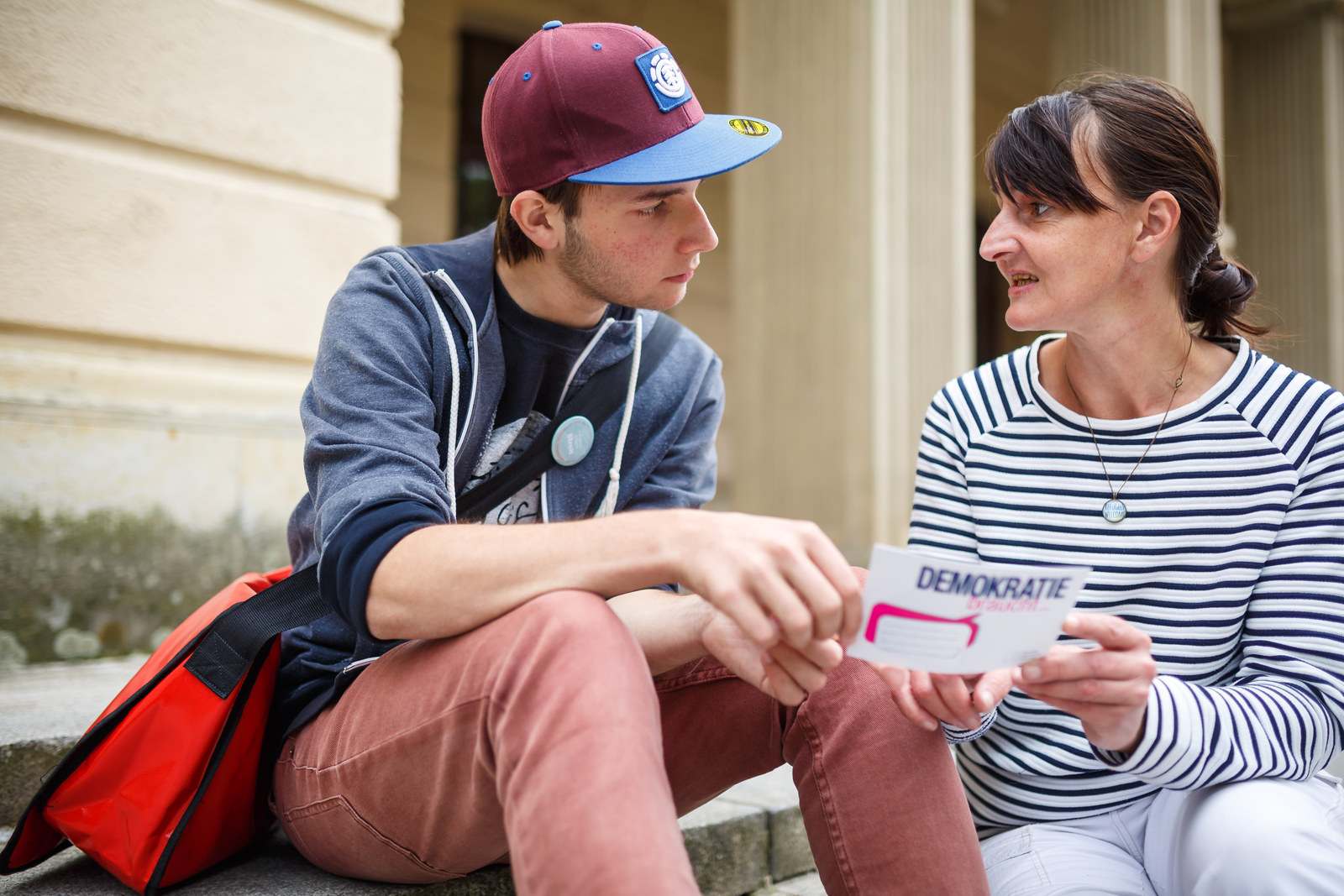
After we finished chatting at the riverbank, Brachtel and I took the train into Freital. We got off at the first stop in town and headed up a winding path, past a small farm with an apple tree and grazing sheep, until we reached the Leonardo. On the night of the worst protesting against the refugees, back in June, Brachtel came here with his mother and a few friends. “We were completely shocked by what we saw,” he said. “We tried to stand in front of the hotel, to be a sort of security. And we did our best to ignore the protesters and to try to make the refugees feel welcome.” The two groups also threw bottles at one another, and briefly clashed. The police didn't show up in force, Brachtel said, until the second night.
At some point since then, German authorities had put up a bright green metal fence around much of the complex, but the entrance was unguarded and we stopped there for a moment to chat with a resident wearing an oversized black T-shirt featuring a cartoon of a rabbit smoking marijuana from a giant bong. (He bought it in Germany, he said, laughing at its strangeness.) The man's name was Sameh al-Mahrous, and he was a refugee from Damascus. The situation around the hotel, Mahrous told us, had been quiet of late. “I heard there were some problems earlier," he said, "but I’ve only been here a month — I haven’t seen anything much.”
He offered to show us around the hotel. Inside, the maroon carpeting was littered with bits of trash and crumbs. “No one cleans here, only us,” Mahrous said. As we walked downstairs to the backyard, where a dozen Tunisian men were playing a frenzied game of soccer on a dirt pitch, Mahrous complained about the monotony of life at this remote, isolated complex. “It’s boring here," he said. "I want to go to a city, not be stuck out here.”
"We only have to wait for the first person to pour oil into the fire — the first rape, the first murder — and then who knows what might happen."
Now and then, Mahrous said, he goes into town, but not very often. “I’m not scared of the people here,” he said. “Sometimes they say something to you, or sometimes you can tell how they feel just from how they look at you. But what can you do? I just ignore it.”
As Brachtel and I left the hotel, Brachtel paused for a moment at a lamp post just outside, where someone had plastered a sticker saying, "Refugees Not Welcome." The image on the sticker showed a family of refugees being moved out of town by train. "It’s just like Auschwitz," Brachtel said, with disgust, as he picked at the sticker. After a moment he gave up. "They're making better stickers now," he said.

The question facing Germany today is whether the extremist attacks and right-wing rhetoric of the past six months represent an outlying phenomenon, or if they are a sign of a deeper antipathy — one that might pose long-term challenges to the refugees' integration into society.
Joachim Klose is a political scientist at the Konrad Adenauer Foundation in Dresden who has studied the right wing in Saxony for many years and watched the rise of Pegida and its allies and affiliates closely. What’s happening now, he told me, is part of a broad social phenomenon rooted in many decades of neglect and attrition in the east of Germany. Since the end of communism, Klose said, the east has been forced to rapidly keep pace with the economic and social development of western Germany — meaning that change has arrived effectively twice as fast.
"The society here went through 45 years of progress in 20 years,” Klose said. "Think about the problems that come up even with a normal pace of change in a society — the normalization of sexuality, racial integration, the changing role of religion — and then double it." Still, the east lags the west in many key demographic and economic indicators: It's poorer, with more personal debt and a higher rate of unemployment. (Saxony's unemployment rate is around 8%, two points higher than the country's average.) In Saxony, Klose said, men outnumber women by 16%, and over the past 30 years, the population has declined by one-fifth. "This makes people feel crazy," he said. "So, to understand Pegida, you have to see that this is a part of society who feels that they are the losers of this development.”
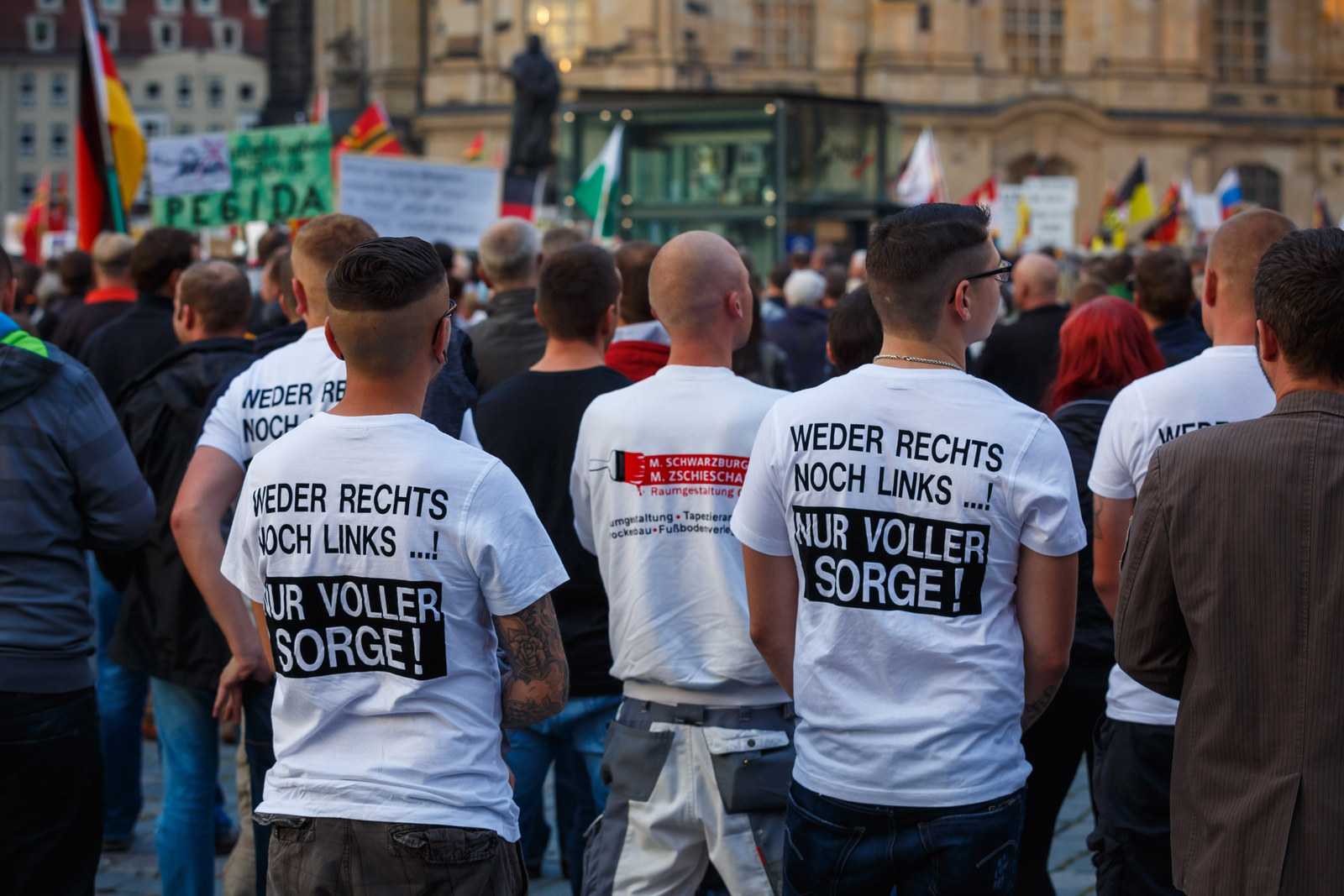
Despite that, the typical Pegida supporter, according to research by the political scientist Hans Vorländer, of Tecnische Universität in Dresden, tends to be middle-class, educated, with an above-average income. But he or she nevertheless views the political system as one operated by elites who have little regard for those people like them. ("We don't trust the government, and the government doesn't trust us," a Pegida supporter told me at a recent rally in Dresden.) Pegida did not respond to my requests for an interview.
In its official rhetoric and imagery, Pegida explicitly denounces the forces of extremism and neo-Nazism. (Its logo includes a stick figure dumping a swastika — as well as the flag of ISIS — into a wastebasket.) For this reason, among others, Klose argues that it’s unhelpful to characterize the movement as merely extremist. “This idea is a problem,” he said. “It pushes conflict on us, it says what should be, and what can't be, in society, and thus that anything that is an outlier is extremist. But you can't call an entire society extremists.”
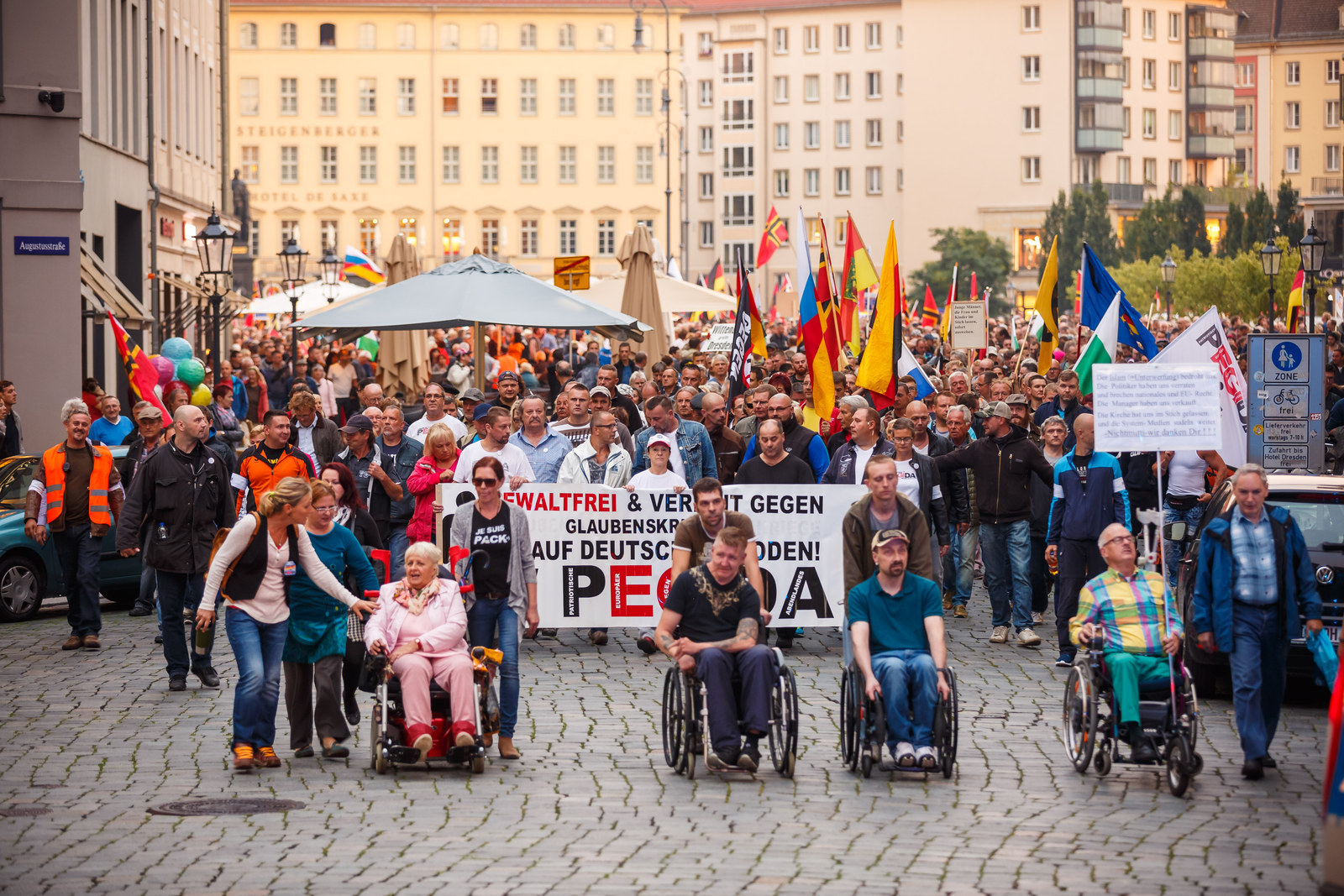
But Eike Sanders, a researcher who works with Ulli Jentsch at Apabiz in Berlin, said that what was so disconcerting about the events in Freital, in particular, was that "it wasn’t just the neo-Nazis who came out. It was that the regular people in the town came out of their houses and joined in the mob.” Sanders believes the lines on the right have become so blurred that Pegida and the more extremist movements have established a sort of mutually beneficial symbiosis. “The problem is that people see something that is racist and they have a tendency to say it's Nazism,” she said. “Of course, that is not necessarily true, or not true of all of them. But it also creates an opening for Pegida to say, ‘Look, we’re not Nazi’ — which is obviously right. And then the far right can say, 'Look at Pegida. We're just speaking out about what the people feel, but what they cannot say.'" (When the June protests started in Freital, Pegida founder Lutz Bachmann, who has a home there, egged on the crowds, writing on his Facebook page, “Take to the streets, people! Defend yourselves!”)
Post-World War II taboos on certain subjects — race, cultural superiority, Nazism — have also made it harder to assess the true state of Germany's right. "In Germany we have a deep divide between public discourse and private discourse on the issues of immigration, race," said Werner Patzelt, another political scientist at Tecnische Universität who has studied right-wing movements. "In public discourse, it is absolutely unacceptable to speak out for setting limits for immigration. But the real-life positions, the real-life atmosphere, in thousands and millions of homes, is not the same. There is much more discomfort and even anger against the political class." He added, "It's wishful thinking on the part of the political class that these phenomena would be simply right-wing phenomena of no greater importance."
For Klose, until more attention is paid to these disaffections, tensions between the locals and any large group of refugees or asylum-seekers are bound to persist. "It's very important to be open for refugees, to be not hostile against them, but that is only one side of the matter," he said. "We have to take care of the people here, too. And we don't do that enough, so I'm a little nervous. We only have to wait for the first person to pour oil into the fire — the first rape, the first murder — and then who knows what might happen.”

Perhaps no one thinks more deeply about these questions than the refugees themselves, who, once they have arrived, must figure out whether there is truly room for them to integrate into German society. In Dresden, I met a 34-year-old Syrian doctor named Abdelwahhab Azzawi who has lived in Germany for a little over a year. Azzawi, who is from Deir Ezzor, in Syria's northeast, and is also an internationally recognized poet, works at the hospital in Freital, in the ophthalmology department. Ignoring the looks and small moments of intolerance, he told me, is a regular, manageable feature of life — he never ventures into the town itself, other than the brief walk from his bus stop to the hospital — but sometimes he finds himself wishing he could write something on his forehead declaring, “I am a doctor. I speak German. I am not a radical Muslim.”
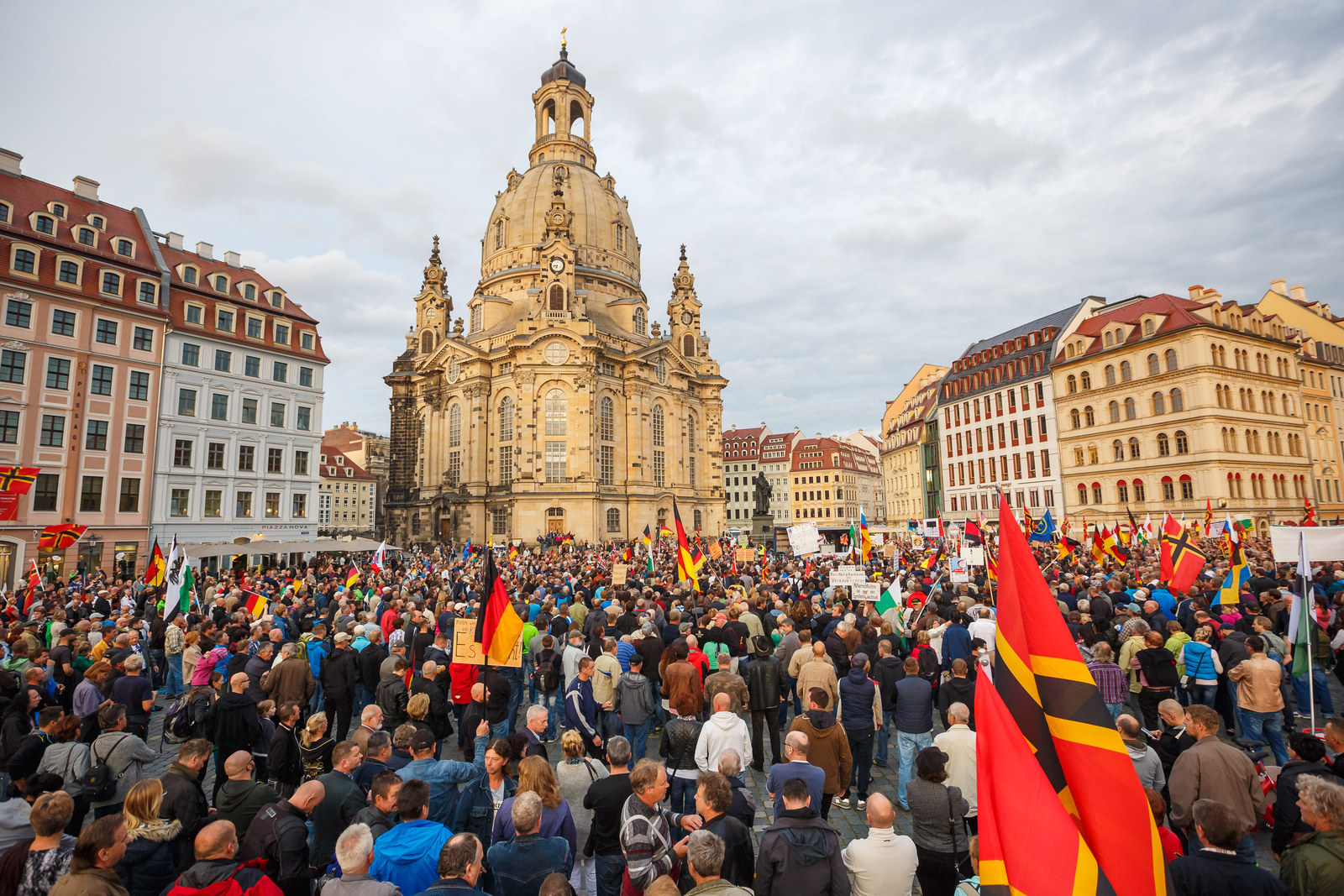
“We are really grateful to the people of Germany for taking us in,” Azzawi said at a café in central Dresden. Some of his German friends have been exceedingly generous to refugees, he said, preparing meals, donating clothes: “They even clean your house if you can’t do it — can you believe that?” Still, there have been moments of disconnect that have took him by surprise. He never goes out after dark, and most Syrians living in Saxony, he said, would be afraid to do so. When he takes the bus to work, he often makes a point of ostentatiously reading a German-language book, but that doesn’t always prevent someone from giving him a nasty glare or blocking his access to an available seat.
At a medical conference recently, a fellow doctor reacted with dismay when Azzawi told him he spoke with his children in Arabic at home. “He looked at me with shock," Azzawi said, "like, ‘How could you do that? We've given you this great opportunity, so why would you want to retain anything from your past?’ This is the big mistake of the Germans. They think integration means that Syrians should become 100% German — with maybe a slightly darker shade of skin.”
"This is the big mistake of the Germans. They think integration means that Syrians should become 100% German — with maybe a slightly darker shade of skin."
Azzawi’s younger brother recently came to join him in Germany — taking the arduous journey across the Mediterranean, then through Macedonia, Greece, Hungary, and Austria — and Azzawi worries about his future. Syrians, he believes, have an obligation to shed themselves of any culturally defensive posture, to open up to the customs and manners of life in Germany. “We need to start our own process of self-criticism,” he said. “We are under the law here, the German law. It is a secular state, and we must respect that.”
But, he said, the obligation goes both ways: “A German friend of mine said to me that in a few years there will come a time for every Syrian where Germany will assess this person for possible citizenship, and the country will ask, is this person deserving of German citizenship? But, my friend said, that should not be the question. The question should be, ‘Did we, as Germans, do what was necessary to give this person a chance?’”
Azzawi went on, “We Syrians have an opportunity here, and we have to take advantage of it. But it is also dependent on all Germans being able to truly give us that opportunity. I’m not sure if they are there yet."

A few days after visiting Freital with Nico Brachtel, I returned without him, and stopped in at a bar called Las Vegas, which Brachtel had described as a popular neo-Nazi hangout. It was early in the afternoon, and the place had just opened, but inside I met a young bartender with a lower-lip piercing and a wide belly who was wiping down the counter with a washcloth. “Oh, I’m so tired of this whole subject,” the bartender, who refused to give his name, said, sighing loudly as he crossed his arms and leaned back on the cabinet behind him. The lights of the slot machines flashed harshly around us, illuminating a gaudy, cartoonish skyline of New York and the Vegas strip that obscured the windows.
For months, the bartender explained, the media — he used the term lugenpresse, which means “lying press,” the Pegida analogue to the Tea Party’s “mainstream media” — had swarmed the town, accusing everyone there of being racist or a neo-Nazi. It was a false accusation, he said, and he was weary of defending himself from it. “So they say we’re all Nazis here, but this is wrong," he said. "Take me, for example. I’m OK with refugees coming here, so long as they are really fleeing war, not just looking for work. I just don’t like the way politicians or the government are dealing with this whole problem.” He continued, “I am not extreme left, and I am not extreme right. I would call myself a patriot.”
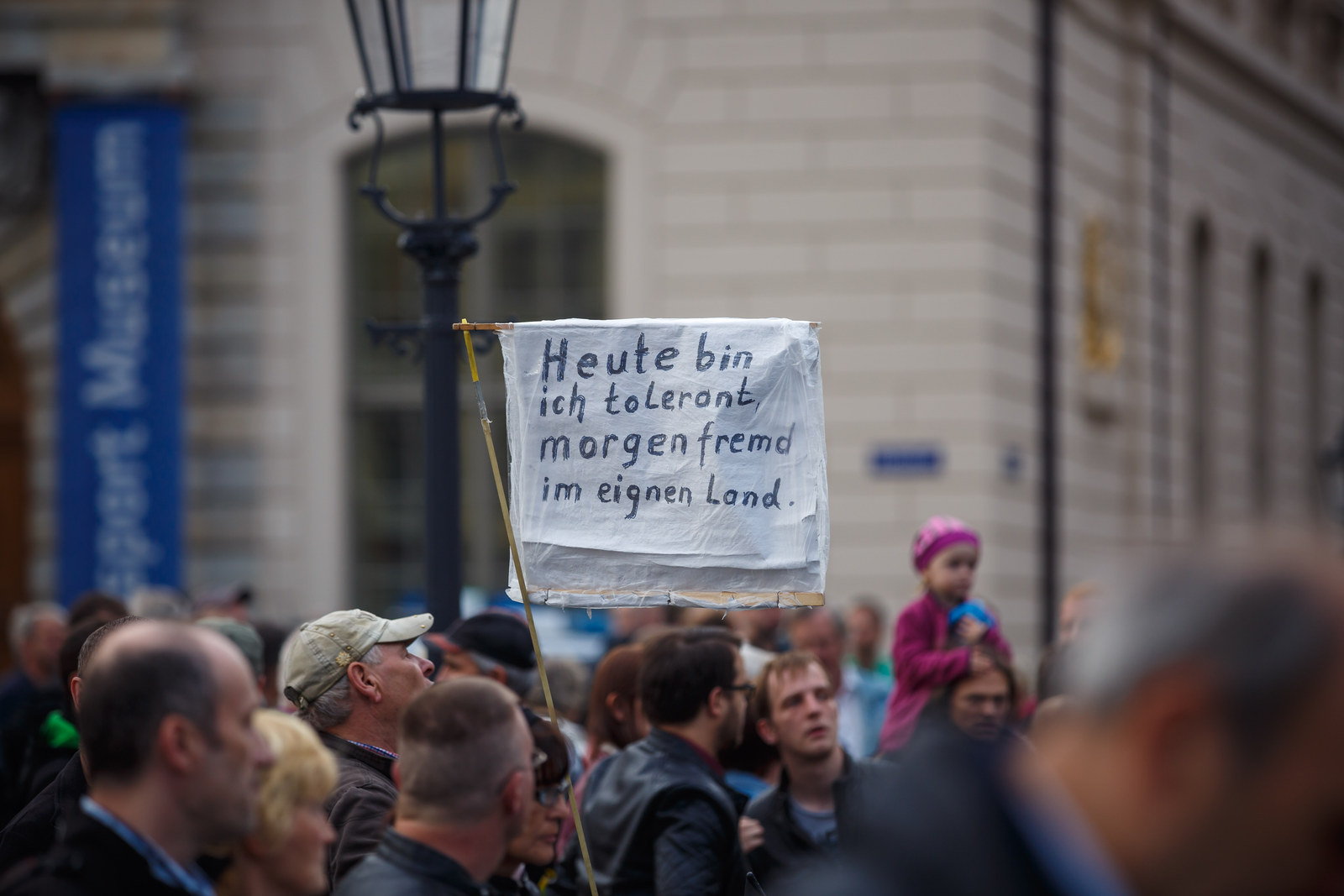
That night, back in Dresden, I went to Pegida's weekly rally in the city center. As we waited for it to start, a well-dressed young man gave me a lecture on how the world misrepresented his movement.
"The media makes us all out to be racists, but that's not true," he said. "Leftists believe we are all Nazis who want to kill the immigrants and don't want to help them at all. This is like its own form of fascism."
I asked him about the burning of refugee asylum homes, and he replied, "This is really obviously not the right thing to do. The real refugees who are coming here are not the right place to take this problem — they are getting used, just like everyone else."
As the rally kicked off, Lutz Bachmann took the stage to chants of "Resistance! Resistance!" His message was similar: Pegida is unfairly made out to be Nazi, when in fact it is nothing of the sort. "They do this because they're afraid of losing power," he said. "Merkel must go!" the crowd roared back. In the months to come, Bachmann went on, Pegida would be forming a proper political party and entering electoral politics itself — "to protect our culture, to protect our country," he said. When he stepped off the stage, I got a glimpse of the back of the T-shirt he was wearing. It showed a silhouette of what appeared to be a Mongol warrior on horseback holding a spear and charging at a fleeing woman and child, and it read, "Islamists Not Welcome."
